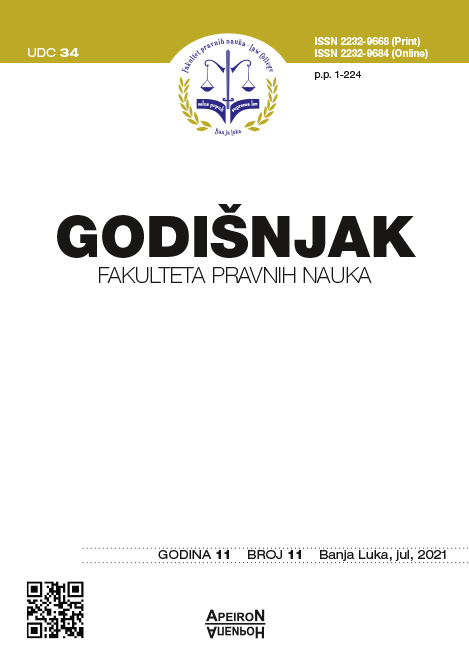Legal Acceptability of the Security Level of the Electronic Identification System
DOI:
https://doi.org/10.7251/GFP2111186MAbstract
Cyberspace is becoming the dominant global arena for the exchange of goods and services. In addition, cyberspace is playing an increasing role in meeting the social needs of the modern human being. Services provided by public administrations are moving to the Internet and modern information and communication technologies. In such an environment, the need for reliable identification of an individual in cyberspace becomes increasingly demanding. E-commerce, as well as e-business in most cases implies the possession of bancing cards as an instrument of non-cash payment transactions. Therefore, a banking card is recognized as an instrument that confirms the identity of an individual within electronic interactions, and the bank can also be seen as a provider of trust services in electronic identification procedures. In a large number of electronic transactions in cyberspace, there is often no need for identity verification via credit cards, because no financial transaction. At the same time, there is a need to reliably determine the identity of an individual in cyberspace. The intensive development of the Internet, the transfer of a large number of business and social activities in cyberspace has led to the need to adapt legal solutions that regulate some activities on the Internet, or the mentioned cyberspace. Thus, a system of reliable digital authentication of transactions and recognition of an individual’s identity when appearing in cyberspace has been developed. In the Republic of Srpska, but also in Bosnia and Herzegovina, legislation has been adopted that recognizes electronic signatures, as well as trust and electronic identification services. Back in 1999, the European Union adopted a regulation for digital signatures, which was replaced by the Regulation on electronic identification and trust services for electronic transactions in the internal market number 910/14, popularly called eIDAS. eIDAS regulations legally regulate the methods of digital identification, as well as the legal validity of electronic documents and electronic business with traditional documents and business. The paper studies the levels of electronic identifications, possible solutions in legislation and practice in the Republic of Srpska and Bosnia and Herzegovina and presents examples from neighboring countries.
